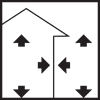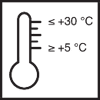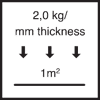Article No. 108425
Fibre-reinforced PCC/SPCC (RM/SRM) for the static repair of concrete structures
Product specifications
7 d = ≥ 40 N/mm²
28 d = ≥ 50 N/mm²
The stated values represent typical product characteristics and are not to be construed as binding product specifications.
Field of application
- Wet spraying method
- Repair and coating mortar according to DIN 19573
- Concrete replacement for structurally relevant repairs
- Concrete replacement according to
- DIN 19573
- DIN EN 1504-3
- Rili-SIB DAfStb 2001
- ZTV-ING - In the drinking water sector, meets the requirements of DVGW Worksheet W 270 and W 347
Properties
- High resistance to chloride penetration
- Sulphate-resistant
- Freeze/thaw-resistant
- Low effective alkali content (SR/NA)
- Spraying and centrifuge application
- Well suited to overhead working
-
Preparation
-
Substrate requirements
Concrete surface:
Stable, clean, dust-free
Observe the applicable technical regulations for the following parameters:
- Adhesive pull strength of the substrate
- Minimum roughness/roughness depthPre-wet the substrate so that it is slightly moist.
Reinforcement:
Degree of purity SA 2 ½ if applying corrosion protection, otherwise SA 2
-
-
Application
-
Working time
(+20 °C): Approx. 60 minutesLayer thickness
Single layer 5 - 25 mm
Two layers < 50 mm, apply wet on wet
Single layer in broken-out areas < 80 mmSubsequent processing
Protect fresh mortar surfaces from wind, direct sunlight, rain and/or frost for at least 3 days so that they do not dry too quickly.
Machine working
Please contact Remmers Technical Service (phone +49 5432 83900) before applying with machine processing.
-
Application instructions
-
Automatic mixing only.
-
-
Working tools / cleaning
-
Mixing tool, trowel, smoothing trowel
Clean tools with water while the material is still fresh.
-
Storage / shelf life
-
If stored in an unopened container and in a dry place, the product will keep for approx. 12 months.
-
Usage
-
Approx. 2.0 kg/m²/mm layer thickness, or approx. 2.0 kg/dm³
-
Apply to a large enough trial area to determine the precise amount required.
-
Disposal instructions
-
Larger quantities of leftover product should be disposed of in the original containers in accordance with the applicable regulations. Completely empty, clean containers should be recycled. Do not dispose of together with household waste. Do not allow to enter the sewage system. Do not empty into drains.
-
-
Safety / regulations
-
For further information on the safety aspects of transporting, storing and handling the product and on disposal and environmental matters, please see the current Safety Data Sheet.
-








